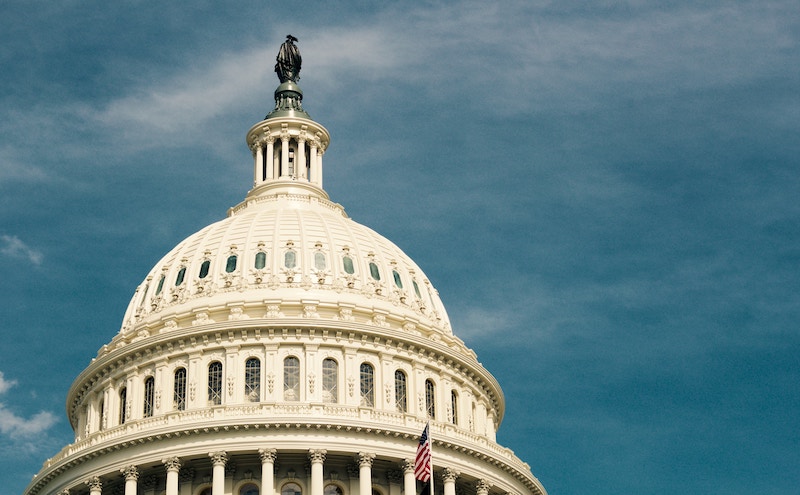USCIS has clarified who is required to pay the $100,000 H-1B fee introduced by President Donald Trump’s Presidential Proclamation on September 19, 2025. This proclamation, titled “Restriction on Entry of Certain Nonimmigrant Workers,” imposed a one-time fee on specific H-1B visa petitions.
The new fee, in addition to existing USCIS filing costs, applies to petitions filed on or after 12:01 a.m. EDT on September 21, 2025. This announcement has raised concerns among U.S. employers, foreign professionals, and immigration advocates due to the unprecedented cost increase and its potential impact on skilled-worker recruitment.
In response to the Proclamation, the U.S. Chamber of Commerce filed a federal lawsuit in the District of Columbia. The lawsuit challenges the Proclamation, arguing that it unlawfully restricts the entry of H-1B professionals and imposes an excessive $100,000 fee on sponsoring employers.
This legal action follows an earlier lawsuit, Global Nurse Force v. Trump, Case No. 3:25-cv-08454 (N.D. Cal., filed October 3, 2025). This lawsuit also contests the legality of the rule, focusing on alleged due process violations and the economic harm to U.S. employers and foreign healthcare workers.
In both cases, the plaintiffs are seeking injunctive relief to block enforcement of the Presidential Proclamation and prevent the implementation of the $100,000 H-1B visa fee.
USCIS’ Updated Guidance Clarifying Who is Responsible for Paying the Fee
The USCIS has published updated guidance (effective October 20, 2025) that clarifies the fee structure, its applicability, and the exceptions that apply.
Here are the key takeaways:
Who is Required to Pay the $100,000 Fee?
- The fee applies to new H-1B petitions filed on or after September 21, 2025, for beneficiaries outside the U.S. who lack a valid H-1B visa.
- It also applies to petitions filed for “consular notification”, even if the beneficiary is physically in the U.S. but the petition is approved for consular processing.
- If a petition requests a change of status, amendment, or extension of stay and that request is denied but approved for consular processing, the fee will apply.
- The petitioning employer must pay the fee before filing through the U.S. Treasury’s pay.gov portal. The filing must include evidence of payment or a previously granted exception, or the petition will be denied.
Who is Not Subject to the Fee/Exemptions?
- Individuals who already hold an approved and valid H-1B visa (issued before the fee took effect) are not subject to the $100,000 fee simply by traveling or renewing their visa.
- Petitions filed before September 21, 2025, at 12:01 a.m. EDT are not subject to the fee.
- Petitions filed for an amendment, change of status, or extension of stay (for beneficiaries already in the U.S.) and approved for that benefit are not subject to the fee. For example, if you are in the U.S. in valid status (e.g., F-1, L-1) and petition for a change of status to H-1B, the fee may not apply.
Rare “National Interest” Exception:
The guidance allows for an exception in “extraordinarily rare circumstances” if:
- The foreign national’s presence is in the national interest of the U.S.
- No U.S. worker is available to fill the role
- The individual does not pose a threat to U.S. security or welfare
- Requiring the fee payment would significantly undermine U.S. interests
However, the threshold is high, and the process is unclear at this point.
Implications and Takeaways
For Employers:
- Companies wishing to sponsor “first-time” H-1B candidates from abroad will need to budget for and likely bear the $100,000 fee.
- If you already have H-1B employees in the U.S. or are filing for extension, amendment, or change of status within the U.S., you may avoid the fee. However, you must ensure that the petition outcome is an approved extension or change, not consular processing.
- The cost increase may force employers to rethink their strategies, such as reducing H-1B hires, shifting roles to internal hires, or relocating roles offshore. Early reports suggest that some companies are already adjusting.
- Legal risks exist, as lawsuits are underway (e.g., by the U.S. Chamber of Commerce) alleging that the fee exceeds executive authority.
For Foreign Workers/Students:
- If you are currently in the U.S. (for example, on F-1 student status) and you are applying to change to H-1B via a change of status petition, you may not need to pay the fee, which is a significant relief.
- If you are outside the U.S. or will need to apply for your H-1B at a U.S. consulate (for the first time) after September 21, you are likely caught by the fee.
- Travel decisions may matter. If you depart the U.S. during adjudication and your petition is switched to consular processing, the fee may be triggered.
- The uncertainty and cost raise questions about long-term planning, especially for those reliant on H-1B sponsorship.
Conclusion:
The $100,000 fee for certain H-1B petitions is a substantial change. The updated guidance from USCIS provides important clarity, but it also highlights the complexity of the rule in practice. For many employers and foreign nationals, the simple question of whether to pay or not depends on fine-grained distinctions, such as the location of the beneficiary, the type of petition (initial vs. extension), the nature of the processing (consular vs. change of status), and prior visa history.
While the guidance provides relief to some, particularly those already residing in the United States, its broader effects on the U.S. labor market, corporations’ recruitment of global talent, and individual career choices remain uncertain. As litigation continues, this is an area to closely monitor.
If you have any questions about this Presidential Proclamation, please contact our Chicago, IL office for guidance. At HSD Immigration Lawyer, we specialize in complex employment– investment- and family-based immigration matters.


